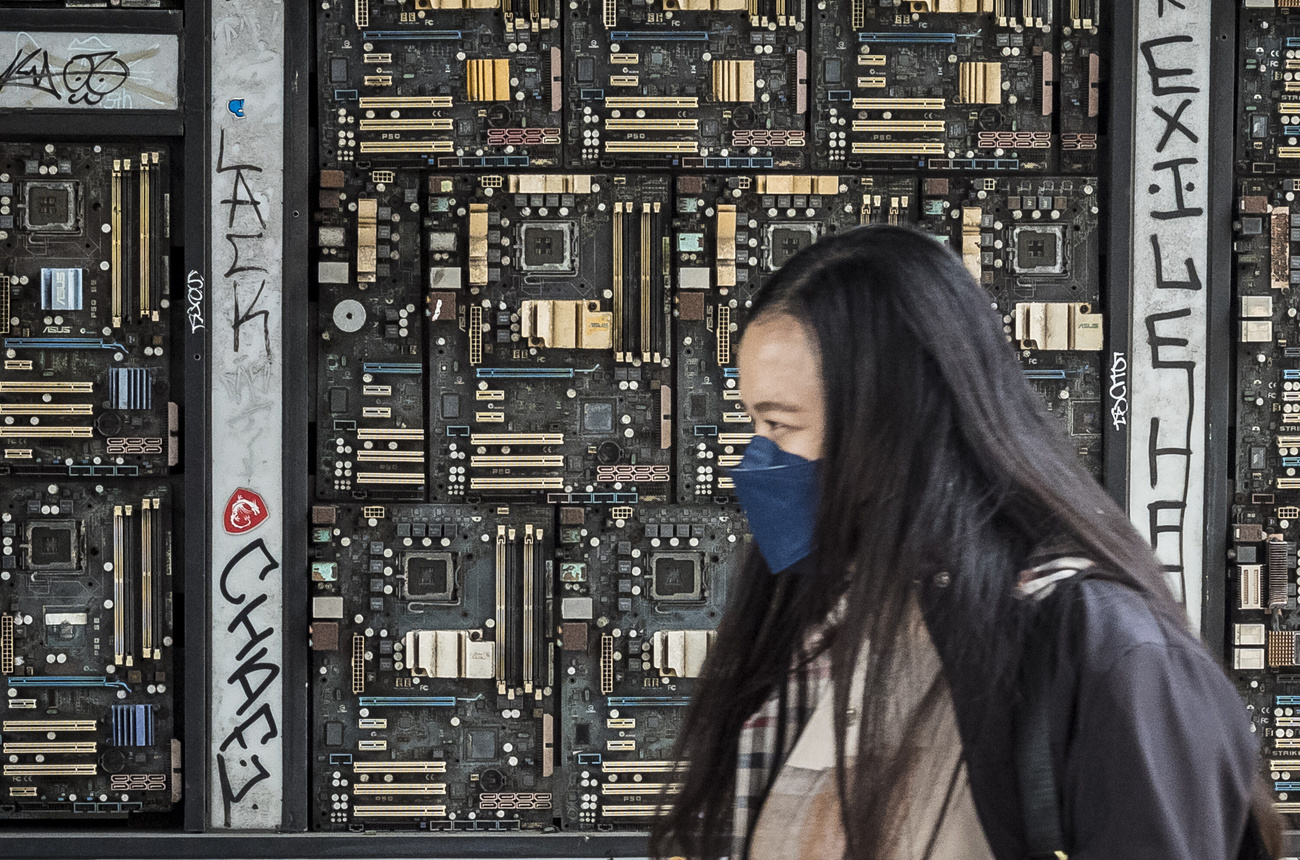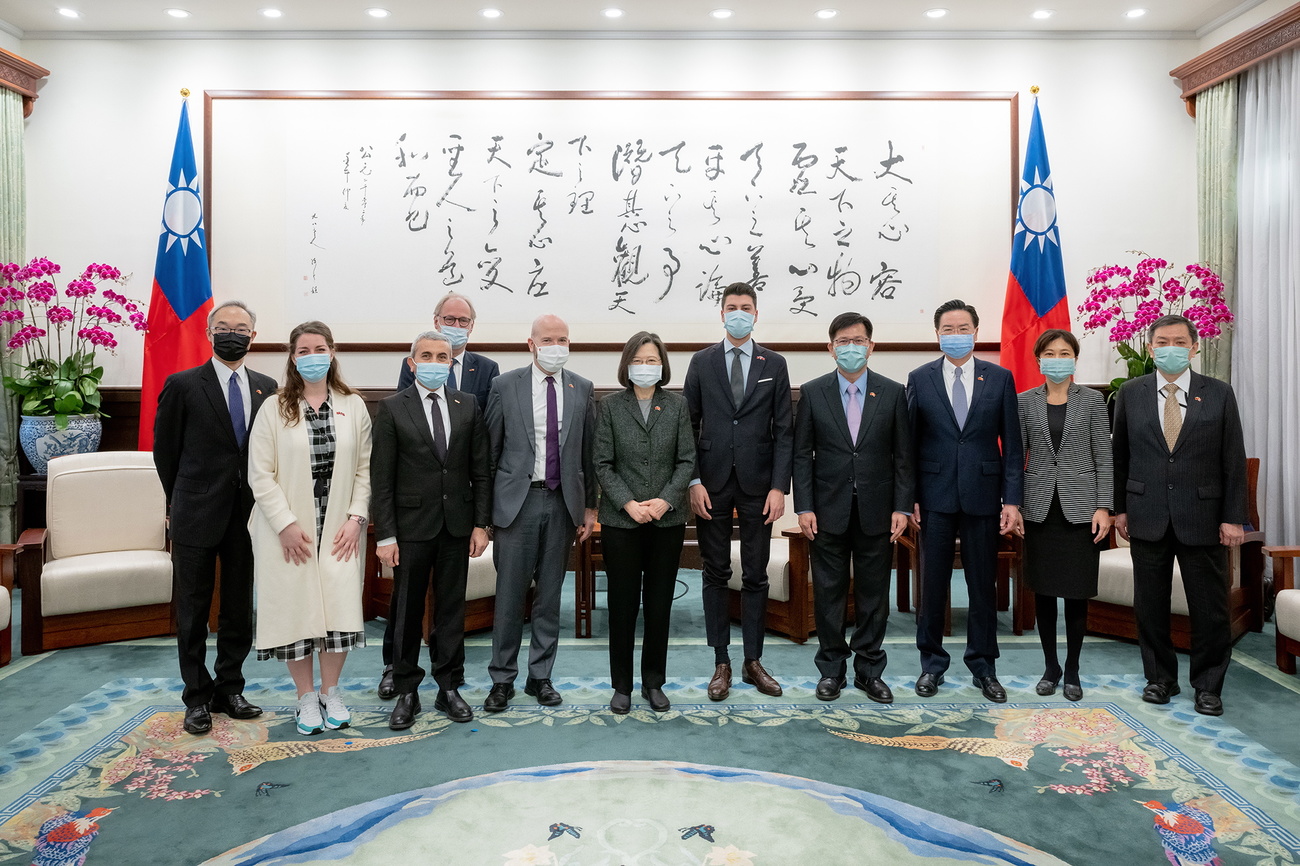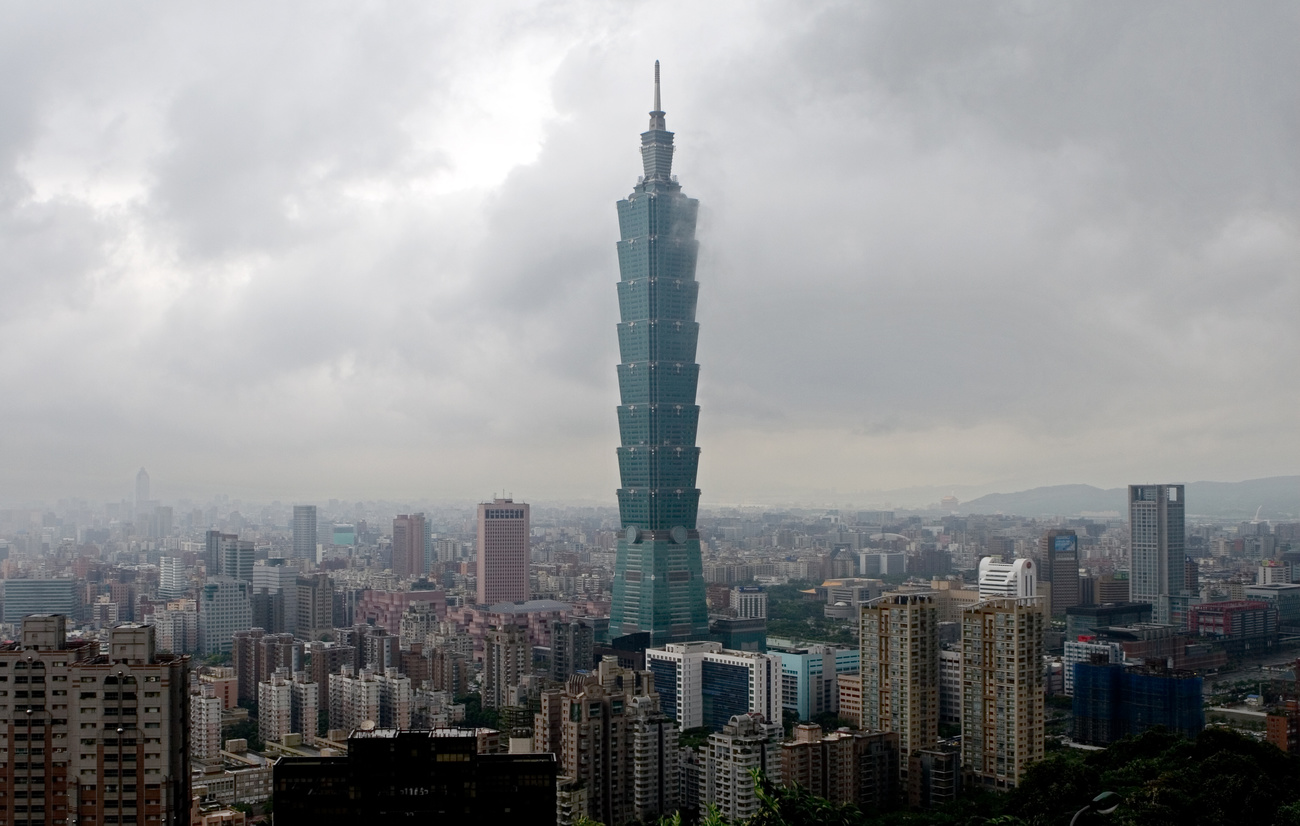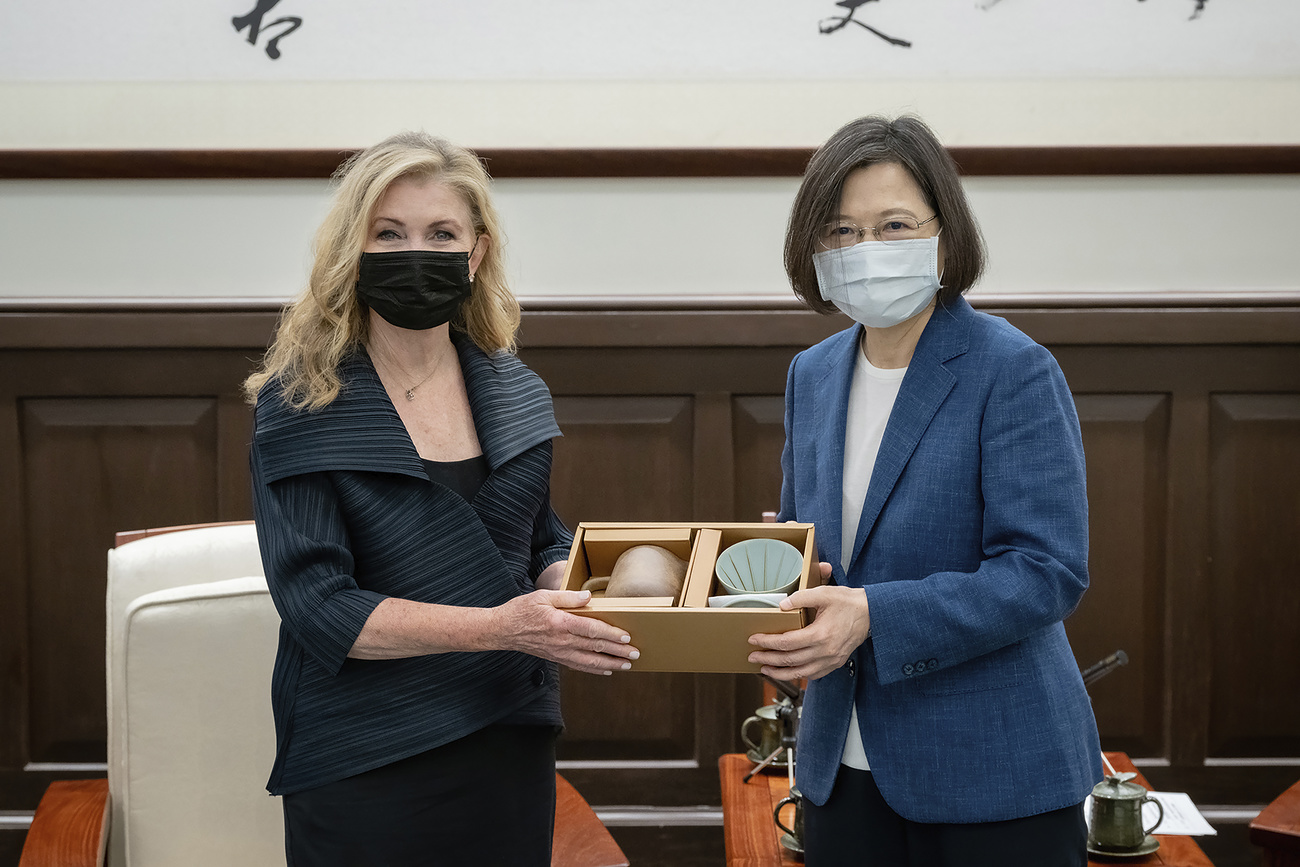Fearing China, Switzerland sacrifices scientific ties with Taiwan

Switzerland has so far refused to strengthen scientific cooperation with Taiwan, citing respect for the One China policy and fearing economic repercussions from Beijing. But this hampers relations with the world’s largest producer of semiconductors, an essential component of electronic devices.
Like most countries in the world, Switzerland does not officially recognise Taiwan. But while many industrialised nations have found other channels to develop their relations with the island claimed by Beijing, Switzerland remains reluctant. This reluctance extends to cooperation in areas where Taiwan is a global leader, such as the development of micro- and nanotechnologies.
The Swiss government has so far refused to sign a bilateral agreement to strengthen scientific and technological cooperation with Taiwan, arguing that this would go against the One China policyExternal link, which mandates keeping diplomatic relations with only one sovereign state recognised under the name of China. It’s a position that some members of Swiss parliament consider to be short-sighted, also because they view it as geopolitically important for Switzerland to strengthen ties with a threatened democracy that shares its values.
“If there is one country with which Switzerland should forge good relations in Asia, it’s Taiwan,” says Fabian Molina of the left-wing Social Democratic Party. “The instruments are there, but they require a certain amount of political will.” Molina is one of the members of the Switzerland-Taiwan Parliamentary Friendship Group who paid an unofficial visit to Taiwan in early February.

Research organisations and institutes in many countries have concluded memorandums of understanding and bilateral framework programmes for exchange with Taiwan, without this calling into question their adherence to the One China principle.
In Switzerland there are also research exchanges and cooperation with Taiwanese universities, but in general the Swiss government – and therefore its research institutions – apply this principle much more rigidly, so that recent attempts to expand and deepen cooperation with Taiwan in the fields of science, technology and innovation were turned down.
“Switzerland interprets the One China policy in a way that is very favourable to Beijing,” says Simona Grano, senior lecturer at the department of sinology at the University of Zurich.
‘Preferential treatment’
For Switzerland, China is seen primarily as a major economic and trade partner, while other European countries and the United States see it as a competitor.
In 2013 Switzerland signed an unprecedented free-trade agreement with China that allows Swiss companies to save several hundred million francs on the export of its goods to China.
“This is a preferential treatment that Beijing reserves for Switzerland, but it can be revoked at any time if the policies conducted in Bern should take directions that China does not like,” says Patrick Ziltener, a professor at the University of Zurich and an expert on foreign economic policy.
So far the Swiss government seems willing to sacrifice cooperation with Taiwan, including on the scientific front, in favour of maintaining preferential economic treatment. But it comes at the expense of areas of research dominated by Taiwan that are crucial for the high-tech industry, such as the development of computer chips and the semiconductors they are made of.
Key source of semiconductors
Taiwan produces around 60% of all computer chips sold worldwide and 90% of the world’s cutting-edge microchips (those below seven nanometres).
The Science Park in Hsinchu, a town on the northwest Taiwanese coast, is home to the world’s largest foundry, owned by the Taiwan Semiconductor Manufacturing Company (TSMC). This places Taiwan at the centre of the geopolitical chessboard, being courted by world powers that need ever-increasing quantities of microchips to run their devices and entire industries. Semiconductors are essential for almost all electronic devices, from refrigerators and washing machines to televisions, computers and smartphones. Smart cars and some bicycles also contain computer chips.
In 2021 alone, global demand for semiconductors grew by 26%, driven by demand for web-based platforms for remote working and distance learning during the pandemic. Sales are expected to rise from $580 billion (CHF532 billion) in 2022 to over $1 trillion by 2030.
However, the global supply chain is threatened by Taiwan’s growing tensions with China, as Chinese military exercises in the Taiwan Strait cause a blockade of the island’s ports and a slowdown in air traffic.
If China were to invade Taiwan, the resulting chip shortage would be devastating for the West. The European Union and the United States are aware of this and are developing a back-up plan.
Switzerland on the sidelines
In February 2022 the EU presented the European Chips ActExternal link to boost semiconductor research, development and production. A few months later the Biden administration signed the Chips and Science ActExternal link to attract Taiwanese chip manufacturers’ investment in the United States. As a result, the Taiwanese giant TSMC recently announced the construction of a second large plant in Arizona. Germany is currently negotiating with TSMC to open its first chip factory in Europe.
Switzerland has so far stayed on the sidelines, although it has also suffered from the chip shortage, especially during the pandemic, when supply chains were disrupted. There are no Swiss government strategies to strengthen relations with Taiwan and its position in the semiconductor sector. According to Chih-Jen Shih, a Taiwanese professor who heads the Institute of Chemistry and Bioengineering at the federal technology institute ETH Zurich, this is a mistake.
“A technological and scientific agreement between Switzerland and Taiwan would certainly increase Swiss competitiveness in the semiconductor sector,” Shih says. Such an agreement, he adds, would give Swiss students access to cutting-edge miniaturised technologies to develop solutions in fields such as artificial intelligence, robotics and cybersecurity, which Switzerland considers strategically important.
TSMC recently launched a programme to drive research on seven-nanometre semiconductors with partner universities. But no Swiss institute is among them. “If Swiss students could be trained in the use of state-of-the-art systems, they would have access to the technology of the future,” Shih says.
Philippe Flückiger, director of operations at the Centre of MicroNanoTechnology at the Swiss Federal Institute of Technology Lausanne (EPFL), agrees that Switzerland should consolidate its semiconductor research, including through increased collaboration with Taiwan. “I think the level of basic scientific knowledge is good in Switzerland, but the engineering and connection with industry could be better,” he says.
No agreement with Taiwan
Taiwan’s importance goes beyond semiconductors. The Asian country invests heavily in areas that Switzerland also targets, such as batteries, photonics and especially biotechnology and nanotechnology for medical and agricultural use. Taiwan is also the sixth-largest export market for Switzerland in Asia.
The Swiss government has bilateral scientific agreements with major Asian trading partners: China, Japan, India, South Korea and Vietnam. But it continues to exclude Taiwan, despite several attempts and pressure at the parliamentary level.
The latest attempt was in June 2022, when Social Democrat parliamentarian Mustafa Atici filed a motionExternal link calling for the consolidation of scientific and technological cooperation with Taiwan. In rejecting the motion, the government wrote that an agreement “would not bring any substantial added value”. It is very likely, however, that the House of Representatives will vote against the government’s opinion and approve it.
Asked by SWI swissinfo.ch about the reasoning behind this statement, the State Secretariat for Education, Research and Innovation (SERI) replied via email that the government encourages “technical” (unofficial) exchanges between Swiss and Taiwanese academic institutions, although it does not conclude bilateral agreements with Taiwan in line with the One China principle.
Indeed, Swiss universities can establish individual agreements with their Taiwanese counterparts. But David Huang, representative of Taipei’s cultural and economic delegation in Bern, believes that is not enough. “Current partnerships are based on a bottom-up approach, conditioned by the personal knowledge of the individual researcher,” he says. This undermines cooperation for those who do not have their own network in Switzerland or Taiwan and greatly restricts the field of collaboration, he adds.
Huang and others believe what’s needed is an umbrella agreement that includes all research institutions, including universities of applied sciences. There were around 30 active collaborations between Swiss and Taiwanese research institutions between 2018 and 2022, according to SERI. That’s compared with more than 400 research collaborations with Japan and nearly 300 with China, both of which have concluded framework agreements on scientific and technological cooperation with Switzerland.
Beijing’s red lines
But change may be afoot. Under pressure from parliament, the government will present a report on Taiwan in the coming weeks, which will also consider possible areas of scientific and cultural cooperation.
Sinologist Simona Grano says this is unlikely to change relations with Taiwan. “I expect that the government will continue to be very cautious and not side too much with Taiwan for fear of incurring the wrath of the People’s Republic of China,” she says.
Switzerland will likely continue to keep a low profile. The government has been trying since 2017 to update its free-trade agreement with China, but due to growing concerns about human rights violations and Beijing’s neutral stance on the war in Ukraine, the room for manoeuvre has narrowed.
A scientific cooperation agreement with Taiwan could hinder trade negotiations with China, which for years has been putting pressure on European states not to cross what it considers diplomatic “red lines” regarding disputed territories such as Macao, Hong Kong and Taiwan.
Although Taiwan is small fry compared to China, Swiss economic interests should not limit scientific research, says Huang. This is an issue close to the heart of the Taiwanese diplomat, who previously worked extensively as a researcher in political science. “By pushing for an agreement, we don’t just want to defend Taiwan but the future of research.”
Edited by Sabrina Weiss and Veronica DeVore

In compliance with the JTI standards
More: SWI swissinfo.ch certified by the Journalism Trust Initiative












You can find an overview of ongoing debates with our journalists here . Please join us!
If you want to start a conversation about a topic raised in this article or want to report factual errors, email us at english@swissinfo.ch.